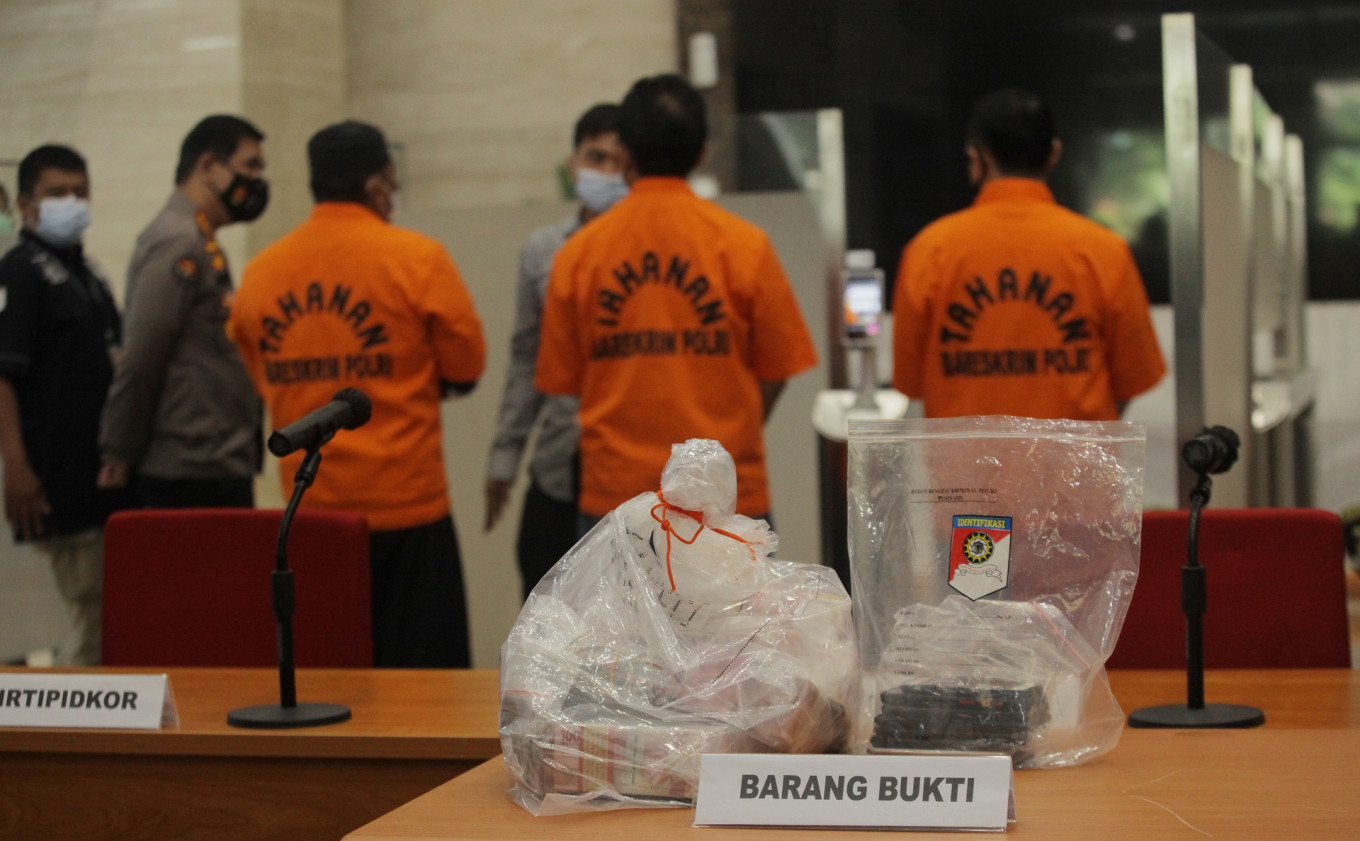Fresh concerns raised after KPK hands recent arrestees over to police
While KPK investigators arrested East Java's Nganjuk regent for alleged bribery, the National Police's Criminal Investigation Department (Bareskrim) will continue the investigation.
Change Size

A
t first glance, it was business as usual when Corruption Eradication Commission (KPK) investigators arrested Novi Rahman Hidayat, the regent of Nganjuk in East Java, for alleged bribery pertaining to the promotion of officials in the regency.
But the antigraft body’s announcement that the investigation of the case would be carried on by the police has raised eyebrows among watchdogs, who argue that such a move contradicts the 2019 KPK Law and may hold back investigators from following new leads from the arrest.
A joint team from the KPK and the National Police’s Criminal Investigation Department (Bareskrim) apprehended Novi on May 9 when he reportedly accepted bribes from several district heads across the regency.
Investigators suspect that bribes were paid through the regent’s aide, M. Izza Muhtadin, in exchange for securing promotions or high-ranking positions in the Nganjuk administration.
The KPK named Novi, Izza and several current and former district heads as suspects and detained them a day after the arrest. Investigators seized Rp 647 million (US$45,321) in cash, several mobile phones and a bank savings book as evidence.
KPK deputy chairwoman Lili Pintauli Siregar said the graft busters were working with Bareskrim investigators on the arrest because the antigraft body and the police had received the same tip-off from a member of the public on the alleged bribery.
“In order to avoid overlaps [in handling the case], the KPK is coordinating and cooperating with Bareskrim in following up the report,” Lili said in a press briefing on Monday. “The operation in the field was carried out by a joint team of two agencies, [but] the case will be handled by Bareskrim.”
Acting KPK spokesperson Ali Fikri emphasized that the case “was not transferred from the commission to Bareskrim, but would be continued” by the latter, because “this case was developed together since the start.”
While it was common for the KPK and the police to work together in the field during an operation, the antigraft body usually handles the investigation and prosecution of the case until a suspect is convicted in court.
National Police spokesperson Insp. Gen. Argo Yuwono echoed Lili and Ali’s statements, appreciating both institutions for working together for the first time in investigating a regional leader suspected of corruption.
The Nganjuk case is the second time the KPK handed over its case to the police in recent years.
In May 2020, KPK investigators arrested a Jakarta State University (UNJ) official under the allegation of bribery. But the antigraft body later handed the case over to the Jakarta Police because the suspect was not considered a state official.
The KPK Law stipulates that the antigraft body only has the authority to conduct investigations of alleged corruption committed by state officials, law enforcement personnel or other people in corruption cases committed by officials.
The Jakarta Police eventually dropped the case in September last year after questioning 44 witnesses, citing a lack of evidence to classify it as a corruption case.
Transparency International Indonesia (TII) researcher Wawan Heru Suyatmiko said the case transfer was a “setback” for the agency tasked with leading the country’s anticorruption efforts.
“The KPK have higher conviction rates [in corruption cases] than other law enforcement bodies, because the agency is specifically tasked with investigating graft cases,” Wawan said.
A report issued by Indonesia Corruption Watch (ICW) in April reveals that the KPK launched 15 new investigations in 2020. The police launched more investigations than the KPK with 170 cases, but the watchdog argued that the former had only investigated lower-echelon officials and lacked “efforts to probe higher-ranking officials with strategic roles in the cases.”
Zaenur Rochman, a researcher at Gadjah Mada University’s Center for Anti-Corruption Studies (Pukat UGM), slammed the KPK for transferring Nganjuk’s case to the police, arguing that it still fell under the commission’s authority according to the regulation.
The 2019 KPK Law stipulates that the antigraft body should only hand over graft cases to other law enforcement institutions if it does not involve law enforcement or state officials or incurred less than Rp 1 billion in state losses.
“The Nganjuk case was allegedly committed by a state official of a regency; therefore, the case falls under the KPK’s jurisdiction,” Zaenur said.
He added that he doubted the police could broaden its investigation of the case and find new suspects from the initial probe, as is usually done by KPK investigators.
In several cases, the antigraft body developed corruption cases that eventually resulted in the investigation of new suspects. An example is the Hambalang graft case, which resulted in the prosecution of dozens of new suspects, including several high-ranking members of the then-ruling Democratic Party.
The National Police’s Argo said on Wednesday that the police would work thoroughly in the investigation, including to search for new possible suspects.
“Bareskrim’s anticorruption unit will conduct an investigation and search for evidence related to similar cases [in other places],” he said. “We’ll make sure that we ask detailed questions on how the money was spent or given.”









